- Home
- Robert E. Howard
The Best of Robert E. Howard: Crimson Shadows (Volume 1) Page 19
The Best of Robert E. Howard: Crimson Shadows (Volume 1) Read online
Page 19
Kull shook off the onrushing dizziness, flung back his head in the old, defiant gesture. He took a long, deep breath as does a strong swimmer before diving into the sea; then, sweeping back the tapestries, made the dais in a single lion-like bound. Brule had spoken truly. There stood men of the Red Slayers, guardsmen trained to move quick as the striking leopard; any but Kull had died ere he could reach the usurper. But the sight of Kull, identical with the man upon the dais, held them in their tracks, their minds stunned for an instant, and that was long enough. He upon the dais snatched for his sword, but even as his fingers closed upon the hilt, Kull’s sword stood out behind his shoulders and the thing that men had thought the king pitched forward from the dais to lie silent upon the floor.
“Hold!” Kull’s lifted hand and kingly voice stopped the rush that had started, and while they stood astounded he pointed to the thing which lay before them — whose face was fading into that of a snake. They recoiled, and from one door came Brule and from another came Ka-nu.
These grasped the king’s bloody hand and Ka-nu spoke: “Men of Valusia, you have seen with your own eyes. This is the true Kull, the mightiest king to whom Valusia has ever bowed. The power of the Serpent is broken and ye be all true men. King Kull, have you commands?”
“Lift that carrion,” said Kull, and men of the guard took up the thing.
“Now follow me,” said the king, and he made his way to the Accursed Room. Brule, with a look of concern, offered the support of his arm but Kull shook him off.
The distance seemed endless to the bleeding king, but at last he stood at the door and laughed fiercely and grimly when he heard the horrified ejaculations of the councilors.
At his orders the guardsmen flung the corpse they carried beside the others, and motioning all from the room Kull stepped out last and closed the door.
A wave of dizziness left him shaken. The faces turned to him, pallid and wonderingly, swirled and mingled in a ghostly fog. He felt the blood from his wound trickling down his limbs and he knew that what he was to do, he must do quickly or not at all.
His sword rasped from its sheath.
“Brule, are you there?”
“Aye!” Brule’s face looked at him through the mist, close to his shoulder, but Brule’s voice sounded leagues and eons away.
“Remember our vow, Brule. And now, bid them stand back.”
His left arm cleared a space as he flung up his sword. Then with all his waning power he drove it through the door into the jamb, driving the great sword to the hilt and sealing the room forever.
Legs braced wide, he swayed drunkenly, facing the horrified councilors. “Let this room be doubly accursed. And let those rotting skeletons lie there forever as a sign of the dying might of the serpent. Here I swear that I shall hunt the serpent-men from land to land, from sea to sea, giving no rest until all be slain, that good triumph and the power of Hell be broken. This thing I swear — I — Kull — king — of — Valusia.”
His knees buckled as the faces swayed and swirled. The councilors leaped forward, but ere they could reach him, Kull slumped to the floor, and lay still, face upward.
The councilors surged about the fallen king, chattering and shrieking. Ka-nu beat them back with his clenched fists, cursing savagely.
“Back, you fools! Would you stifle the little life that is yet in him? How, Brule, is he dead or will he live?” — to the warrior who bent above the prostrate Kull.
“Dead?” sneered Brule irritably. “Such a man as this is not so easily killed. Lack of sleep and loss of blood have weakened him — by Valka, he has a score of deep wounds, but none of them mortal. Yet have those gibbering fools bring the court women here at once.”
Brule’s eyes lighted with a fierce, proud light.
“Valka, Ka-nu, but here is such a man as I knew not existed in these degenerate days. He will be in the saddle in a few scant days and then may the serpent-men of the world beware of Kull of Valusia. Valka! But that will be a rare hunt! Ah, I see long years of prosperity for the world with such a king upon the throne of Valusia.”
THE MIRRORS OF TUZUN THUNE
Weird Tales, September 1929
“A wild, weird clime that lieth sublime
Out of Space, out of Time.”
— Poe.
There comes, even to kings, the time of great weariness. Then the gold of the throne is brass, the silk of the palace becomes drab. The gems in the diadem and upon the fingers of the women sparkle drearily like the ice of the white seas; the speech of men is as the empty rattle of a jester’s bell and the feel comes of things unreal; even the sun is copper in the sky and the breath of the green ocean is no longer fresh.
Kull sat upon the throne of Valusia and the hour of weariness was upon him. They moved before him in an endless, meaningless panorama, men, women, priests, events and shadows of events; things seen and things to be attained. But like shadows they came and went, leaving no trace upon his consciousness, save that of a great mental fatigue. Yet Kull was not tired. There was a longing in him for things beyond himself and beyond the Valusian court. An unrest stirred in him and strange, luminous dreams roamed his soul. At his bidding there came to him Brule the Spear-slayer, warrior of Pictland, from the islands beyond the West.
“Lord king, you are tired of the life of the court. Come with me upon my galley and let us roam the tides for a space.”
“Nay.” Kull rested his chin moodily upon his mighty hand. “I am weary beyond all these things. The cities hold no lure for me — and the borders are quiet. I hear no more the sea-songs I heard when I lay as a boy on the booming crags of Atlantis, and the night was alive with blazing stars. No more do the green woodlands beckon me as of old. There is a strangeness upon me and a longing beyond life’s longings. Go!”
Brule went forth in a doubtful mood, leaving the king brooding upon his throne. Then to Kull stole a girl of the court and whispered:
“Great king, seek Tuzun Thune, the wizard. The secrets of life and death are his, and the stars in the sky and the lands beneath the seas.”
Kull looked at the girl. Fine gold was her hair and her violet eyes were slanted strangely; she was beautiful, but her beauty meant little to Kull.
“Tuzun Thune,” he repeated. “Who is he?”
“A wizard of the Elder Race. He lives here, in Valusia, by the Lake of Visions in the House of a Thousand Mirrors. All things are known to him, lord king; he speaks with the dead and holds converse with the demons of the Lost Lands.”
Kull arose.
“I will seek out this mummer; but no word of my going, do you hear?”
“I am your slave, my lord.” And she sank to her knees meekly, but the smile of her scarlet mouth was cunning behind Kull’s back and the gleam of her narrow eyes was crafty.
Kull came to the house of Tuzun Thune, beside the Lake of Visions. Wide and blue stretched the waters of the lake and many a fine palace rose upon its banks; many swan-winged pleasure boats drifted lazily upon its hazy surface and evermore there came the sound of soft music.
Tall and spacious, but unpretentious, rose the House of a Thousand Mirrors. The great doors stood open and Kull ascended the broad stair and entered, unannounced. There in a great chamber, whose walls were of mirrors, he came upon Tuzun Thune, the wizard. The man was ancient as the hills of Zalgara; like wrinkled leather was his skin, but his cold gray eyes were like sparks of sword steel.
“Kull of Valusia, my house is yours,” said he, bowing with old-time courtliness and motioning Kull to a throne-like chair.
“You are a wizard, I have heard,” said Kull bluntly, resting his chin upon his hand and fixing his somber eyes upon the man’s face. “Can you do wonders?”
The wizard stretched forth his hand; his fingers opened and closed like a bird’s claws.
“Is that not a wonder — that this blind flesh obeys the thoughts of my mind? I walk, I breathe, I speak — are they all not wonders?”
Kull meditated awhile, then spoke. “Can yo
u summon up demons?”
“Aye. I can summon up a demon more savage than any in ghostland — by smiting you in the face.”
Kull started, then nodded. “But the dead, can you talk to the dead?”
“I talk with the dead always — as I am talking now. Death begins with birth and each man begins to die when he is born; even now you are dead, King Kull, because you were born.”
“But you, you are older than men become; do wizards never die?”
“Men die when their time comes. No later, no sooner. Mine has not come.”
Kull turned these answers over in his mind.
“Then it would seem that the greatest wizard of Valusia is no more than an ordinary man, and I have been duped in coming here.”
Tuzun Thune shook his head. “Men are but men, and the greatest men are they who soonest learn the simpler things. Nay, look into my mirrors, Kull.”
The ceiling was a great many mirrors, and the walls were mirrors, perfectly jointed, yet many mirrors of many sizes and shapes.
“Mirrors are the world, Kull,” droned the wizard. “Gaze into my mirrors and be wise.”
Kull chose one at random and looked into it intently. The mirrors upon the opposite wall were reflected there, reflecting others, so that he seemed to be gazing down a long, luminous corridor, formed by mirror behind mirror; and far down this corridor moved a tiny figure. Kull looked long ere he saw that the figure was the reflection of himself. He gazed and a queer feeling of pettiness came over him; it seemed that that tiny figure was the true Kull, representing the real proportions of himself. So he moved away and stood before another.
“Look closely, Kull. That is the mirror of the past,” he heard the wizard say.
Gray fogs obscured the vision, great billows of mist, ever heaving and changing like the ghost of a great river; through these fogs Kull caught swift fleeting visions of horror and strangeness; beasts and men moved there and shapes neither men nor beasts; great exotic blossoms glowed through the grayness; tall tropic trees towered high over reeking swamps, where reptilian monsters wallowed and bellowed; the sky was ghastly with flying dragons and the restless seas rocked and roared and beat endlessly along the muddy beaches. Man was not, yet man was the dream of the gods and strange were the nightmare forms that glided through the noisome jungles. Battle and onslaught were there, and frightful love. Death was there, for Life and Death go hand in hand. Across the slimy beaches of the world sounded the bellowing of the monsters, and incredible shapes loomed through the steaming curtain of the incessant rain.
“This is of the future.”
Kull looked in silence.
“See you — what?”
“A strange world,” said Kull heavily. “The Seven Empires are crumbled to dust and are forgotten. The restless green waves roar for many a fathom above the eternal hills of Atlantis; the mountains of Lemuria of the West are the islands of an unknown sea. Strange savages roam the elder lands and new lands flung strangely from the deeps, defiling the elder shrines. Valusia is vanished and all the nations of today; they of tomorrow are strangers. They know us not.”
“Time strides onward,” said Tuzun Thune calmly. “We live today; what care we for tomorrow — or yesterday? The Wheel turns and nations rise and fall; the world changes, and times return to savagery to rise again through the long ages. Ere Atlantis was, Valusia was, and ere Valusia was, the Elder Nations were. Aye, we, too, trampled the shoulders of lost tribes in our advance. You, who have come from the green sea hills of Atlantis to seize the ancient crown of Valusia, you think my tribe is old, we who held these lands ere the Valusians came out of the East, in the days before there were men in the sea lands. But men were here when the Elder Tribes rode out of the waste lands, and men before men, tribe before tribe. The nations pass and are forgotten, for that is the destiny of man.”
“Yes,” said Kull. “Yet is it not a pity that the beauty and glory of men should fade like smoke on a summer sea?”
“For what reason, since that is their destiny? I brood not over the lost glories of my race, nor do I labor for races to come. Live now, Kull, live now. The dead are dead; the unborn are not. What matters men’s forgetfulness of you when you have forgotten yourself in the silent worlds of death? Gaze in my mirrors and be wise.”
Kull chose another mirror and gazed into it.
“That is the mirror of the deepest magic; what see ye, Kull?”
“Naught but myself.”
“Look closely, Kull; is it in truth you?”
Kull stared into the great mirror, and the image that was his reflection returned his gaze.
“I come before this mirror,” mused Kull, chin on fist, “and I bring this man to life. This is beyond my understanding, since first I saw him in the still waters of the lakes of Atlantis, till I saw him again in the gold-rimmed mirrors of Valusia. He is I, a shadow of myself, part of myself — I can bring him into being or slay him at my will; yet” — he halted, strange thoughts whispering through the vast dim recesses of his mind like shadowy bats flying through a great cavern — “yet where is he when I stand not in front of a mirror? May it be in man’s power thus lightly to form and destroy a shadow of life and existence? How do I know that when I step back from the mirror he vanishes into the void of Naught?
“Nay, by Valka, am I the man or is he? Which of us is the ghost of the other? Mayhap these mirrors are but windows through which we look into another world. Does he think the same of me? Am I no more than a shadow, a reflection of himself — to him, as he to me? And if I am the ghost, what sort of a world lives upon the other side of this mirror? What armies ride there and what kings rule? This world is all I know. Knowing naught of any other, how can I judge? Surely there are green hills there and booming seas and wide plains where men ride to battle. Tell me, wizard who are wiser than most men, tell me, are there worlds beyond our worlds?”
“A man has eyes, let him see,” answered the wizard. “Who would see must first believe.”
The hours drifted by and Kull still sat before the mirrors of Tuzun Thune, gazing into that which depicted himself. Sometimes it seemed that he gazed upon hard shallowness; at other times gigantic depths seemed to loom before him. Like the surface of the sea was the mirror of Tuzun Thune; hard as the sea in the sun’s slanting beams, in the darkness of the stars, when no eye can pierce her deeps; vast and mystic as the sea when the sun smites her in such way that the watcher’s breath is caught at the glimpse of tremendous abysses. So was the mirror in which Kull gazed.
At last the king rose with a sigh and took his departure still wondering. And Kull came again to the House of a Thousand Mirrors; day after day he came and sat for hours before the mirror. The eyes looked out at him, identical with his, yet Kull seemed to sense a difference — a reality that was not of him. Hour upon hour he would stare with strange intensity into the mirror; hour after hour the image gave back his gaze.
The business of the palace and of the council went neglected. The people murmured; Kull’s stallion stamped restlessly in his stable and Kull’s warriors diced and argued aimlessly with one another. Kull heeded not. At times he seemed on the point of discovering some vast, unthinkable secret. He no longer thought of the image in the mirror as a shadow of himself; the thing, to him, was an entity, similar in outer appearance, yet basically as far from Kull himself as the poles are far apart. The image, it seemed to Kull, had an individuality apart from Kull’s; he was no more dependent on Kull than Kull was dependent on him. And day by day Kull doubted in which world he really lived; was he the shadow, summoned at will by the other? Did he instead of the other live in a world of delusion, the shadow of the real world?
Kull began to wish that he might enter the personality beyond the mirror for a space, to see what might be seen; yet should he manage to go beyond that door could he ever return? Would he find a world identical with the one in which he moved? A world, of which his was but a ghostly reflection? Which was reality and which illusion?
At time
s Kull halted to wonder how such thoughts and dreams had come to enter his mind and at times he wondered if they came of his own volition or — here his thoughts would become mazed. His meditations were his own; no man ruled his thoughts and he would summon them at his pleasure; yet could he? Were they not as bats, coming and going, not at his pleasure but at the bidding or ruling of — of whom? The gods? The Women who wove the webs of Fate? Kull could come to no conclusion, for at each mental step he became more and more bewildered in a hazy gray fog of illusory assertions and refutations. This much he knew: that strange visions entered his mind, like bats flying unbidden from the whispering void of non-existence; never had he thought these thoughts, but now they ruled his mind, sleeping and waking, so that he seemed to walk in a daze at times; and his sleep was fraught with strange, monstrous dreams.
“Tell me, wizard,” he said, sitting before the mirror, eyes fixed intently upon his image, “how can I pass yon door? For of a truth, I am not sure that that is the real world and this the shadow; at least, that which I see must exist in some form.”
“See and believe,” droned the wizard. “Man must believe to accomplish. Form is shadow, substance is illusion, materiality is dream; man is because he believes he is; what is man but a dream of the gods? Yet man can be that which he wishes to be; form and substance, they are but shadows. The mind, the ego, the essence of the god-dream — that is real, that is immortal. See and believe, if you would accomplish, Kull.”
The king did not fully understand; he never fully understood the enigmatical utterances of the wizard, yet they struck somewhere in his being a dim responsive chord. So day after day he sat before the mirrors of Tuzun Thune. Ever the wizard lurked behind him like a shadow.
Then came a day when Kull seemed to catch glimpses of strange lands; there flitted across his consciousness dim thoughts and recognitions. Day by day he had seemed to lose touch with the world; all things had seemed each succeeding day more ghostly and unreal; only the man in the mirror seemed like reality. Now Kull seemed to be close to the doors of some mightier worlds; giant vistas gleamed fleetingly; the fogs of unreality thinned, “form is shadow, substance is illusion; they are but shadows” sounded as if from some far country of his consciousness. He remembered the wizard’s words and it seemed to him that now he almost understood — form and substance, could not he change himself at will, if he knew the master key that opened this door? What worlds within what worlds awaited the bold explorer?

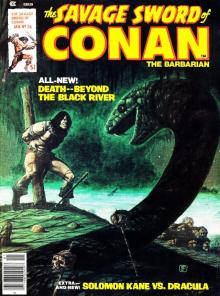 Beyond the Black River
Beyond the Black River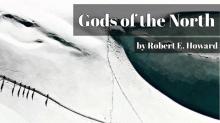 Gods of the North
Gods of the North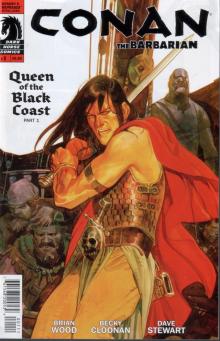 Queen of the Black Coast
Queen of the Black Coast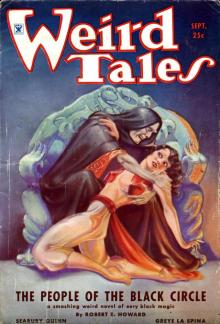 The People of the Black Circle
The People of the Black Circle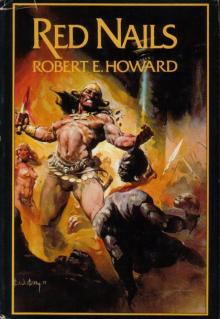 Red Nails
Red Nails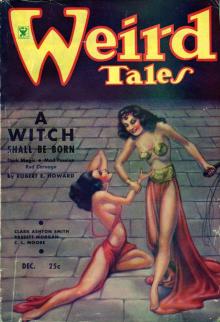 A Witch Shall Be Born
A Witch Shall Be Born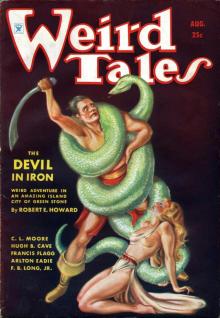 The Devil in Iron
The Devil in Iron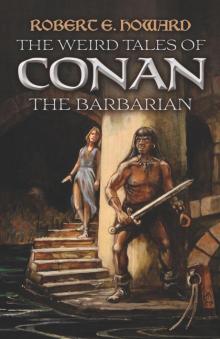 The Weird Tales of Conan the Barbarian
The Weird Tales of Conan the Barbarian The Bloody Crown of Conan
The Bloody Crown of Conan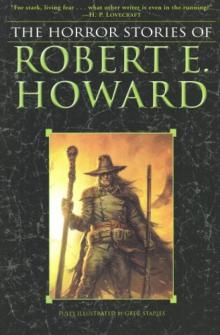 The Horror Stories of Robert E. Howard
The Horror Stories of Robert E. Howard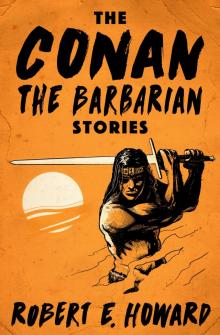 Conan the Conqueror
Conan the Conqueror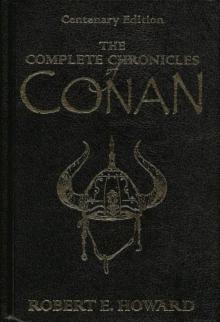 Conan the Barbarian
Conan the Barbarian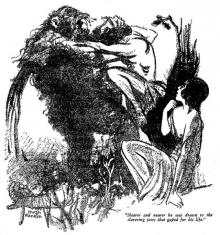 Shadows in the Moonlight
Shadows in the Moonlight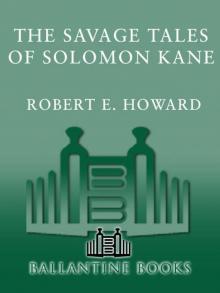 The Savage Tales of Solomon Kane
The Savage Tales of Solomon Kane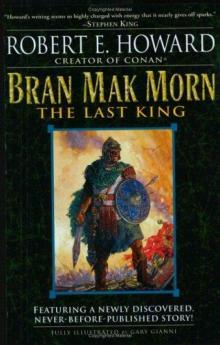 Bran Mak Morn: The Last King
Bran Mak Morn: The Last King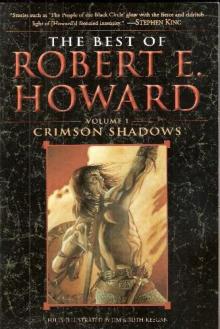 The Best of Robert E. Howard Volume One: Crimson Shadows
The Best of Robert E. Howard Volume One: Crimson Shadows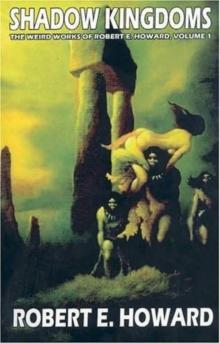 The Best of Robert E. Howard: Crimson Shadows (Volume 1)
The Best of Robert E. Howard: Crimson Shadows (Volume 1)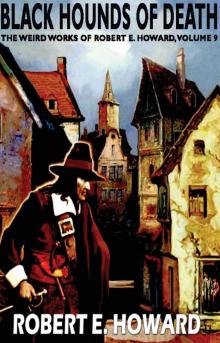 Black Hounds of Death
Black Hounds of Death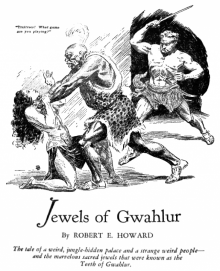 Jewels of Gwahlur
Jewels of Gwahlur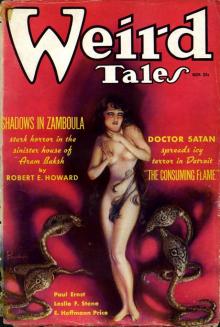 Shadows in Zamboula
Shadows in Zamboula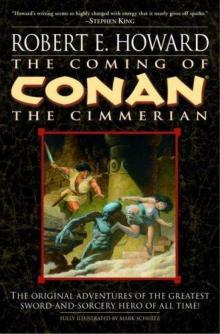 The Coming of Conan the Cimmerian
The Coming of Conan the Cimmerian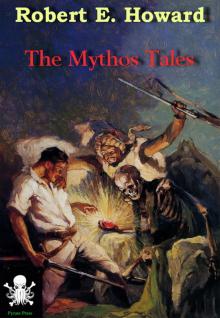 The Mythos Tales
The Mythos Tales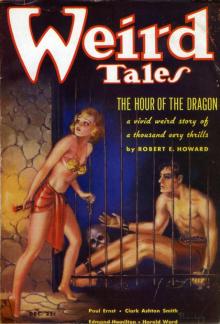 The Hour of the Dragon
The Hour of the Dragon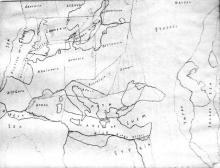 The Hyborian Age
The Hyborian Age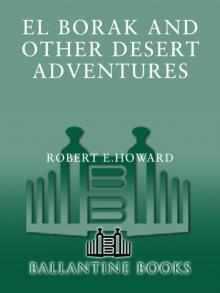 El Borak and Other Desert Adventures
El Borak and Other Desert Adventures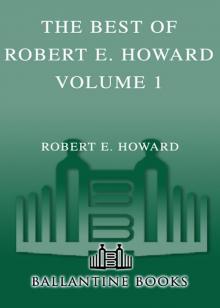 The Best of Robert E. Howard Volume 1 The Best of Robert E. Howard Volume 1
The Best of Robert E. Howard Volume 1 The Best of Robert E. Howard Volume 1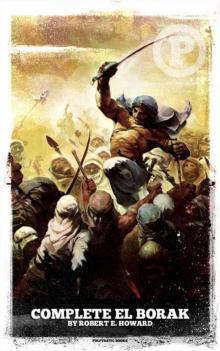 El Borak: The Complete Tales
El Borak: The Complete Tales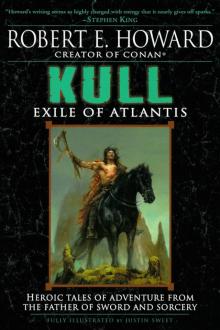 Kull: Exile of Atlantis
Kull: Exile of Atlantis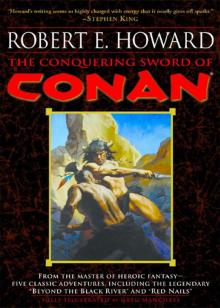 The Conquering Sword of Conan
The Conquering Sword of Conan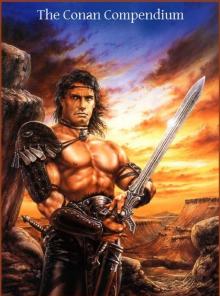 The Conan Compendium
The Conan Compendium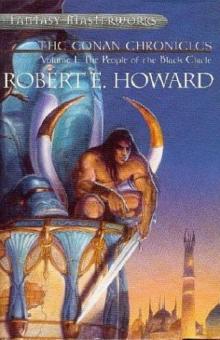 The Conan Chronicles: Volume 1: The People of the Black Circle
The Conan Chronicles: Volume 1: The People of the Black Circle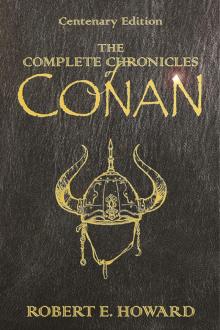 The Complete Chronicles of Conan: Centenary Edition
The Complete Chronicles of Conan: Centenary Edition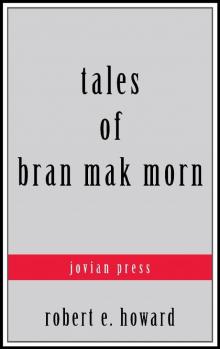 Tales of Bran Mak Morn (Serapis Classics)
Tales of Bran Mak Morn (Serapis Classics)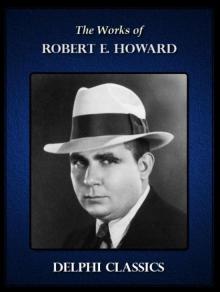 Delphi Works of Robert E. Howard (Illustrated) (Series Four)
Delphi Works of Robert E. Howard (Illustrated) (Series Four)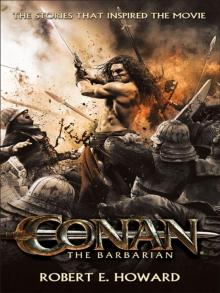 Conan the Barbarian: The Stories That Inspired the Movie
Conan the Barbarian: The Stories That Inspired the Movie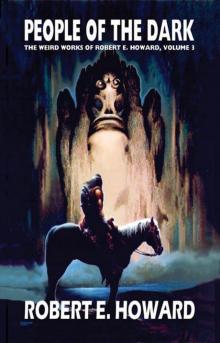 People of the Dark Robert Ervin Howard
People of the Dark Robert Ervin Howard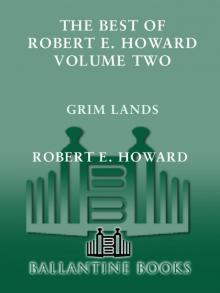 Grim Lands
Grim Lands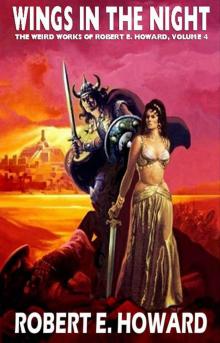 Wings in the Night
Wings in the Night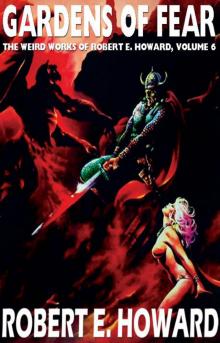 Gardens of Fear
Gardens of Fear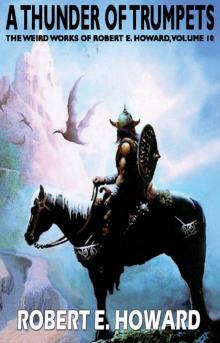 A Thunder of Trumpets
A Thunder of Trumpets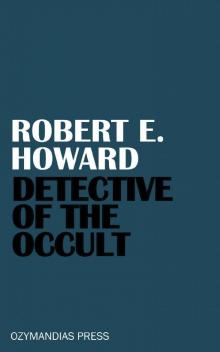 Detective of the Occult
Detective of the Occult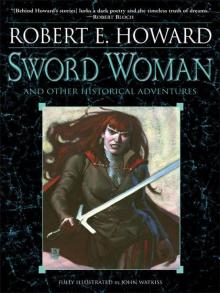 Sword Woman and Other Historical Adventures
Sword Woman and Other Historical Adventures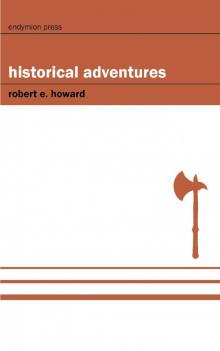 Historical Adventures
Historical Adventures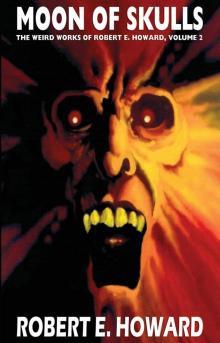 Moon of Skulls
Moon of Skulls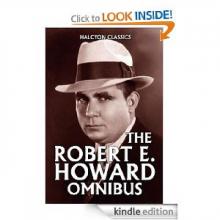 The Robert E. Howard Omnibus: 97 Collected Stories
The Robert E. Howard Omnibus: 97 Collected Stories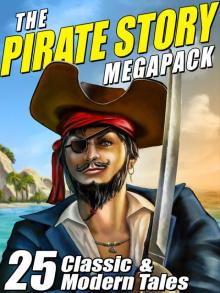 The Pirate Story Megapack: 25 Classic and Modern Tales
The Pirate Story Megapack: 25 Classic and Modern Tales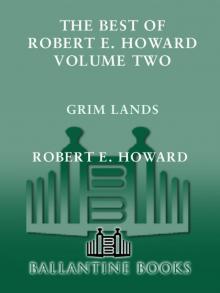 The Best of Robert E. Howard, Volume 2
The Best of Robert E. Howard, Volume 2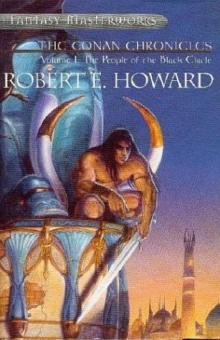 The Conan Chronicles, Vol. 1: The People of the Black Circle
The Conan Chronicles, Vol. 1: The People of the Black Circle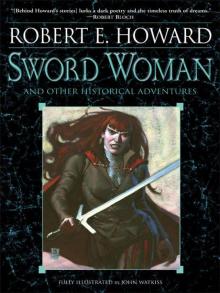 Sword Woman and Other Historical Adventures M
Sword Woman and Other Historical Adventures M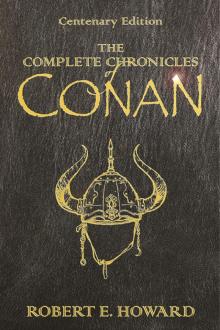 The Complete Chronicles of Conan
The Complete Chronicles of Conan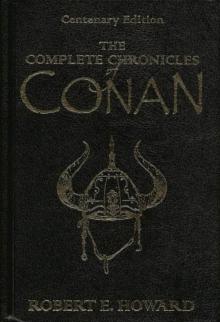 Conan the Barbarian: The Chronicles of Conan (collected short stories)
Conan the Barbarian: The Chronicles of Conan (collected short stories)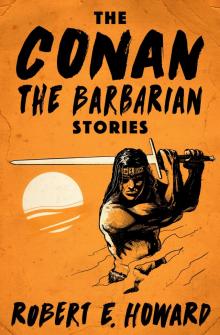 The Conan the Barbarian Stories
The Conan the Barbarian Stories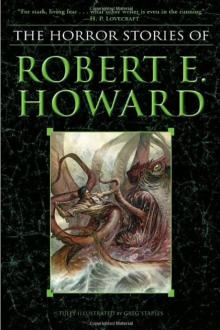 The Best Horror Stories of
The Best Horror Stories of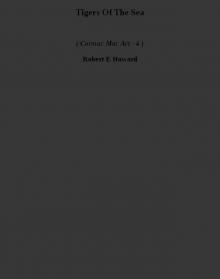 Tigers Of The Sea cma-4
Tigers Of The Sea cma-4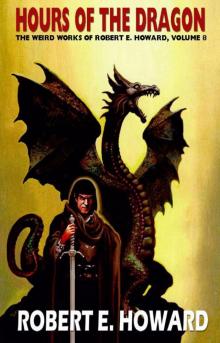 The Hours of the Dragon
The Hours of the Dragon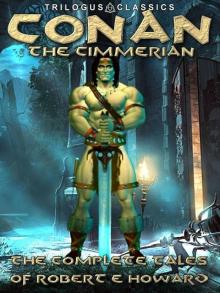 Conan the Cimmerian: The Complete Tales (Trilogus Classics)
Conan the Cimmerian: The Complete Tales (Trilogus Classics)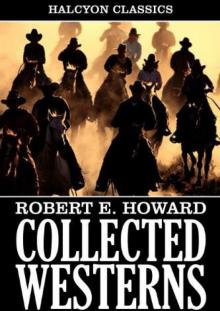 Collected Western Stories of Robert E. Howard (Unexpurgated Edition) (Halcyon Classics)
Collected Western Stories of Robert E. Howard (Unexpurgated Edition) (Halcyon Classics)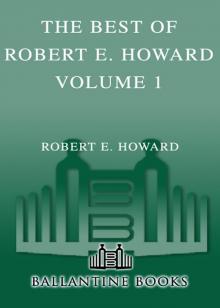 The Best of Robert E. Howard, Volume 1
The Best of Robert E. Howard, Volume 1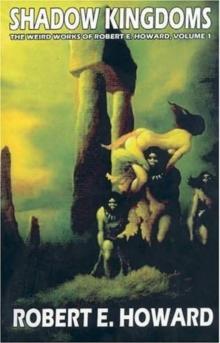 Shadow Kingdoms
Shadow Kingdoms